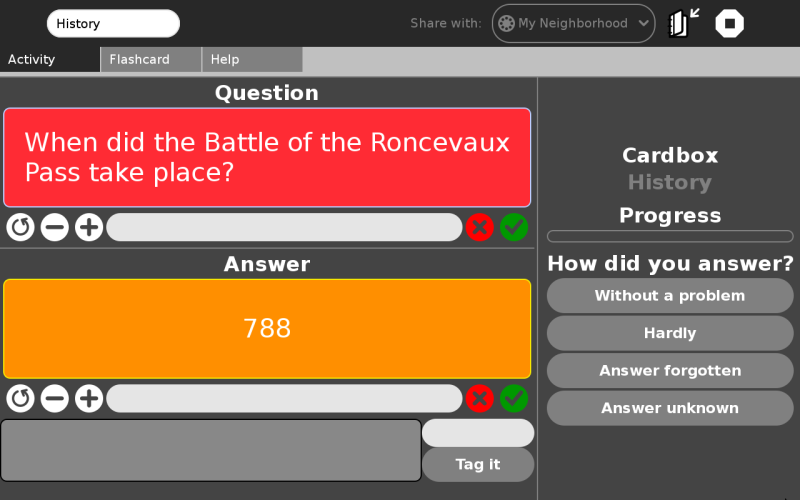Assimilate
Assimilate for OLPC
Motivation
After using so many free as in free speech tools, I wanted to contribute to the cause and learn the inner workings of open source development. Seeing that currently in the OLPC project there is no good old fashioned flashcards like activity, I decided to create one by myself but trying to apply some ideas and concepts of constructivism theory as suggested in Nicholas Negroponte's "Being Digital" or Seymour Papert's "Children's Machine" books.
Description
The assimilate activity is a flashcards based activity with a constructivist touch. Based on Leitner's spaced repetition system, this activity adds too some ideas of constructivist theory in order to assimilate new knowledge more efficiently and help the students construct new flashcards by themselves. By reaching consensus, either by discussing answers in the classroom or by merging the content added by students individually, the questionnaires will be somehow validated with only little guidance needed by the teacher, who could later check how much ease or trouble each flashcard offered and analyze the relations created amongst different flashcards through tag grouping or by having similar answers (even if they pertain to very different topics)
Instead of using flashcards to memorize the information, the idea is to help children learn the concepts in their own terms by redefining or rephrasing questions and answers and show them that information with context is knowledge.
Screenshot
Roadmap
- I've already coded the basic functionality to use it as a standalone flashcard activity
- It's working under sugar-jhbuild and emulation with QEMU
- The database is also completed with triggers added to implement foreign key references (sqlite lacks FK support)
- Throughout April I intend to develop a class to handle which flashcard should the student be studying next (leitner system plus randomly a question related to the one working at the moment even if it's not on the same questionnaire)
- The rest of the basic functionalities are to be implemented too on April, and suggestions, comments and new ideas would be taken into account.
- The use of presence and telepathy libraries should be finished by the beginning of May and I'd like to code freeze to fix bugs and polish the code until the end of the May.
- As this is somehow based on the so-called WEB 2.0 concept, feedback of potential users of the activity would be much appreciated; it's all about the users.
Features
- Creation of questionnaires and their flashcards, with multiple questions and answers in each card.
- Tagging of the flashcards to categorize and relate them.
- To help children associate content, each question and answer is showed with the colors of the buddy who created them.
- Each added question and answer should be evaluated according to some criteria to decide whether is correct or incorrect
- Whenever more than 3 incorrect answers are in the flashcard, the question could be used in test quiz mode.
- Hints to help students remember the answers in the form of mnemotecnic tricks.
- Collaboration and sharing of cards to allow children build their own content and reach consensus by 'wisdom of the crowd'
- Using gestalt pattern matching similar text strings can be related
Technology Choice
- SQLite to store the data
- PyGTK for the frontend of the application.
- Telepathy tubes for sending/receiving data.
Status Update
There is already some working code and I filled an application to host it on the OLPC git hosting.
Contact Me
My name is Urko Fernandez. Comments, criticism and ideas are always welcome in the discussion page or at - tturktime - AT - gmail.com. (where ' - AT - ' = @, to avoid spam email scanners)
